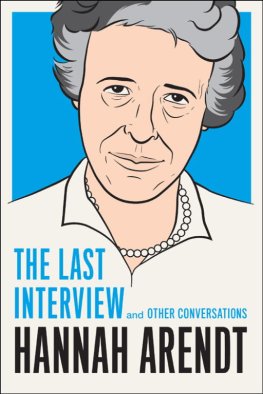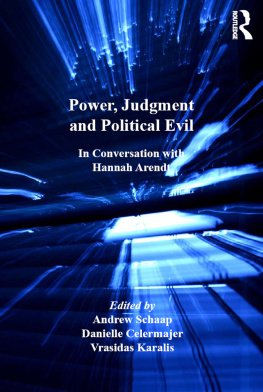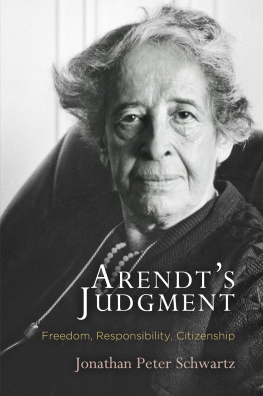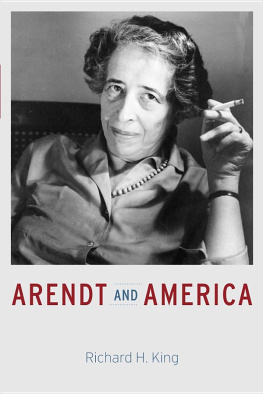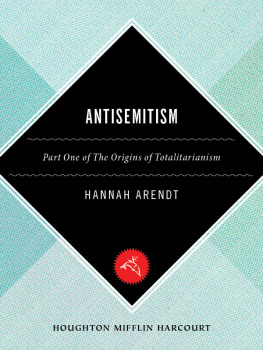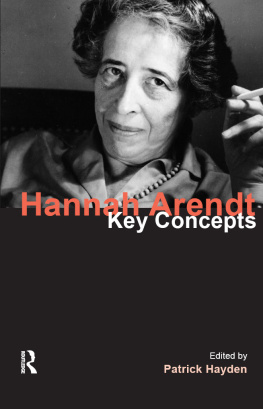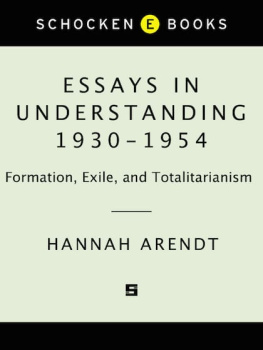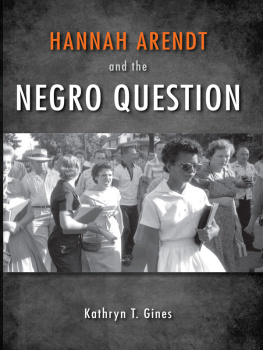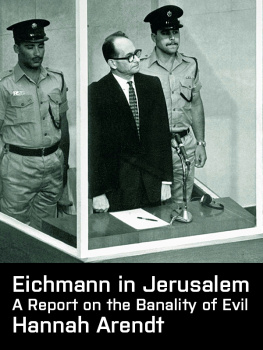Hannah Arendt
THE LAST INTERVIEW
AND OTHER CONVERSATIONS

WHAT REMAINS? THE LANGUAGE REMAINS: A CONVERSATION WITH GNTER GAUS
ZUR PERSON, ZDF TV, GERMANY
OCTOBER 28, 1964
TRANSLATED BY JOAN STAMBAUGH
On October 28, 1964, the following conversation between Hannah Arendt and Gnter Gaus, at the time a well-known journalist and later a high official in Willy Brandts government, was broadcast on West German television. The interview was awarded the Adolf Grimme Prize and was published the following year under the title Was bleibt? Es bleibt die Muttersprache in Gnter Gaus, Zur Person, Munich, 1965. This English translation is by Joan Stambaugh and it first appeared in Essays on Understanding, edited by Jerome Kohn (Harcourt Brace Jovanovich, 1994).
Gaus begins the conversation by saying that Arendt is the first woman to take part in the series of interviews he is conducting; then he immediately qualifies that statement by noting that she has a very masculine occupation, namely, that of philosopher. This leads him to his first question: In spite of the recognition and respect she has received, does she perceive her role in the circle of philosophers as unusual or peculiar because she is a woman? Arendt replies:
ARENDT: I am afraid I have to protest. I do not belong to the circle of philosophers. My profession, if one can even speak of it at all, is political theory. I neither feel like a philosopher, nor do I believe that I have been accepted in the circle of philosophers, as you so kindly suppose. But to speak of the other question that you raised in your opening remarks: you say that philosophy is generally thought to be a masculine occupation. It does not have to remain a masculine occupation! It is entirely possible that a woman will one day be a philosopher
GAUS: I consider you to be a philosopher
ARENDT: Well, I cant help that, but in my opinion I am not. In my opinion I have said good-bye to philosophy once and for all. As you know, I studied philosophy, but that does not mean that I stayed with it.
GAUS: I should like to hear from you more precisely what the difference is between political philosophy and your work as a professor of political theory.
ARENDT: The expression political philosophy, which I avoid, is extremely burdened by tradition. When I talk about these things, academically or nonacademically, I always mention that there is a vital tension between philosophy and politics. That is, between man as a thinking being and man as an acting being, there is a tension that does not exist in natural philosophy, for example. Like everyone else, the philosopher can be objective with regard to nature, and when he says what he thinks about it he speaks in the name of all mankind. But he cannot be objective or neutral with regard to politics. Not since Plato!
GAUS: I understand what you mean.
ARENDT: There is a kind of enmity against all politics in most philosophers, with very few exceptions. Kant is an exception. This enmity is extremely important for the whole problem, because it is not a personal question. It lies in the nature of the subject itself.
GAUS: You want no part in this enmity against politics because you believe that it would interfere with your work?
ARENDT: I want no part in this enmity, thats it exactly! I want to look at politics, so to speak, with eyes unclouded by philosophy.
GAUS: I understand. Now, let us turn to the question of womens emancipation. Has this been a problem for you?
ARENDT: Yes, of course; there is always the problem as such. I have actually been rather old-fashioned. I have always thought that there are certain occupations that are improper for women, that do not become them, if I may put it that way. It just doesnt look good when a woman gives orders. She should try not to get into such a situation if she wants to remain feminine. Whether I am right about this or not I do not know. I myself have always lived in accordance with this more or less unconsciouslyor let us rather say, more or less consciously. The problem itself played no role for me personally. To put it very simply, I have always done what I liked to do.
GAUS: Your workwe will surely go into details lateris to a significant degree concerned with the knowledge of the conditions under which political action and behavior come about. Do you want to achieve extensive influence with these works, or do you believe that such influence is no longer possible in these times, or is it simply not important to you?
ARENDT: You know, that is not a simple question. If I am to speak very honestly I would have to say: When I am working, I am not interested in how my work might affect people.
GAUS: And when you are finished?
ARENDT: Then I am finished. What is important for me is to understand. For me, writing is a matter of seeking this understanding, part of the process of understanding Certain things get formulated. If I had a good enough memory to really retain everything that I think, I doubt very much that I would have written anythingI know my own laziness. What is important to me is the thought process itself. As long as I have succeeded in thinking something through, I am personally quite satisfied. If I then succeed in expressing my thought process adequately in writing, that satisfies me also.
You ask about the effects of my work on others. If I may wax ironical, that is a masculine question. Men always want to be terribly influential, but I see that as somewhat external. Do I imagine myself being influential? No. I want to understand. And if others understandin the same sense that I have understoodthat gives me a sense of satisfaction, like feeling at home.
GAUS: Do you write easily? Do you formulate ideas easily?
ARENDT: Sometimes I do; sometimes I dont. But in general I can tell you that I never write until I can, so to speak, take dictation from myself.
GAUS: Until you have already thought it out.
ARENDT: Yes. I know exactly what I want to write. I do not write until I do. Usually I write it all down only once. And that goes relatively quickly, since it really depends only on how fast I type.
GAUS: Your interest in political theory, in political action and behavior, is at the center of your work today. In this light, what I found in your correspondence with Professor Scholem seems particularly interesting. There you wrote, if I may quote you, that you were interested in [your] youth neither in politics nor in history. Miss Arendt, as a Jew you emigrated from Germany in 1933. You were then twenty-six years old. Is your interest in politicsthe cessation of your indifference to politics and historyconnected to these events?
ARENDT: Yes, of course. Indifference was no longer possible in 1933. It was no longer possible even before that.
GAUS: For you as well?
ARENDT: Yes, of course. I read the newspapers intently. I had opinions. I did not belong to a party, nor did I have need to. By 1931 I was firmly convinced that the Nazis would take the helm. I was always arguing with other people about it but I did not really concern myself systematically with these things until I emigrated.
GAUS: I have another question about what you just said. If you were convinced that the Nazis could not be stopped from taking power, didnt you feel impelled actively to do something to prevent thisfor example, join a partyor did you no longer think that made sense?

